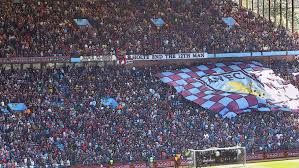Photo by Wikimedia Commons 2.0
While the growth of football globally has extended to many different pursuits in recent times, nothing can replicate the reality of being at the stadium and supporting a team.
A burgeoning social media scene has led to a litany of footballing experts being forged, all happy to make cultural observations on the way in which the game is played yet for most hardy fans, the brass tacks of being on the terraces can never be replaced.
Often referred to as the 12th man, home support across all levels of football can play a massive role in which the way a team performs and the results that they get.
Intimidating atmospheres always make it difficult for visiting sides to come out and play their best football and all punters and football betting sites are all too aware of the role a passionate fanbase can have.
From the size and grandeur of the Nou Camp for Barcelona to the intimacy and vocal Anfield with Liverpool, football teams are built by their supporters and those in the stands go through every wave of emotion with their team.
So-called armchair fans are happy to pass on their opinions, but nothing competes with the atmosphere of being pitch side, so let’s take a look at the role of the 12th man within modern day footballing society.
Home Comforts
Playing in front of home support is always a key benefit for any side when they play their regular league games – simply because the majority of those in the stadium will be wanting them to win.
Since the Premier League’s inception back in 1992, 46% of home games have been won – indicative of the impact playing in front of home fans can have.
Familiarities such as pre-match routines, meals and changing foibles are always useful but the creation of a positive atmosphere and being cheered on to succeed, also helps players reach new heights.
Not to mention, the opposition potentially being inhibited by being jeered or cheered against and this combination of factors plays a key role in the fans impacting on the field of play.
All In This Together
Naturally, when assessing the impact of a passionate fan base and the concept of the 12th man, it is easy to think of successful and positive moments for teams.
Liverpool famously coming back from 3-0 down to beat Barcelona in 2019 has become famed for the incredible sense of atmosphere created at Anfield that night.
The frantic nature of Manchester City fans when they scored in the dying embers to win the 2012 and 2022 Premier League titles.
These are examples of pure euphoria for a team, where fans and players have seized the moment to create nuggets of history for their club.
However, the 12th man and what it means to clubs can also come to the fore in times of need too, when things aren’t going too well on the pitch.
Everton’s infamous comeback against Crystal Palace in 2022, to preserve their long-standing Premier League status, or the feverish atmosphere inside St James’s Park when Newcastle came from behind to draw 4-4 with Arsenal in 2011.
Both are examples of how when a team is struggling, they can be lifted by those inside the stadium and that positivity and good will, can translate into improved performances on the pitch.
Fans First
One of the key issues football fans are facing worldwide is the speed at which the game is growing.
Every club is in a better financial position for adhering to the demands of the media providers, rather than their own fans and as a result, a sense of discontent can be created between those who run football clubs and those who support them.
For as many incredible stories of investment and riches into the game as there has been in recent times, there have been plenty of other teams that have been met with false promises and financial mismanagement.
Two English footballing stalwarts in Bury FC and Chester City have both ceased to exist due to financial misgivings. However, through fan funding and community spirit, both clubs have been reborn and have had to rebuild their way up the English footballing pyramid.
Bigger clubs such as Leeds United, Coventry City, Portsmouth and Sheffield Wednesday have also endured their fair share of financial struggles, with fans coming to the fore to help their clubs in their hour of need too.
The game would be nothing without fans, as proved by the absence of patrons in the stands during the COVID 19 pandemic and there appears to be a conscious effort by most clubs to protect the rights of those who pay to watch the action.
Responsible Fans
One of the key criticisms levelled at football fans over the generations has been how territorial the game has become.
Hooliganism was rife in English football in the 1970’s and 80’s and with nationalistic waves sweeping countries worldwide, there have been increased hooliganism issues in European and South American football in recent times.
Creating a hostile environment for a visiting side is key when supporting a team and fans have a responsibility to make sure that is done in a respectful and inclusive manner.
Football in theory is the sport that knows no boundaries, that judges people by their performance on the pitch solely and it has been labelled the beautiful game as a result.
Fans are there to enhance the sense of atmosphere and drama, in every game and the concept of the 12th man is as important to football now, as it ever has been before.




